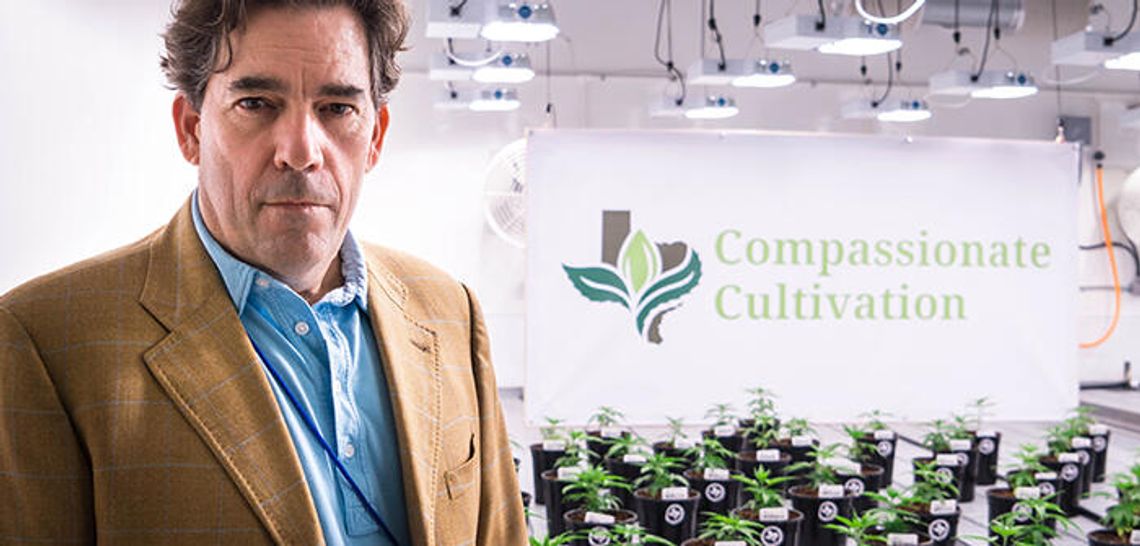A large green bow bobbed on the head of three-year-old Bri Jackson as she climbed out of her stroller and into her mother’s arms.
The bow, affixed in Bri’s golden locks, was a symbol of celebration for her mother, Manor resident Kaia Jackson. On Friday, Jackson was one of a handful of people in Texas to obtain a prescription for themselves or children for medical cannabidol and tetrahydrocannibinol (CBD and THC) oil, or medical cannabis.
For Kaia, the oil was seen as a possible panacea that could help her daughter deal with daily seizures. That’s why Jackson didn’t mind making the trip to Manchaca to pick up their prescription.
“It’s awesome. It’s like, finally. She is on these heavy duty pharmaceutical drugs that has these side effects and she is not seeing relief from that,” Kaia Jackson said. “For some, CBD-THC is a miracle drug that changed their kids’ lives and helped them not to have seizures anymore.”
The use of CBD-THC oil for medical purposes became official Sept. 1, 2017 when the Texas Compassionate Use Act officially went into effect.
The act, which was approved as Senate Bill 339 in the 84th Texas Legislature in 2015, requires the Texas Department of Public Safety to create a secure registry of physicians who can prescribe low-THC to patients with intractable epilepsy.
Intractable epilepsy is a disorder where seizures are not controlled with two or more pharmaceutical medications. Under SB 339, DPS was also allowed authority to license three businesses that can cultivate, process and dispense medical cannabis.
One of those businesses is Compassionate Cultivation, located in Manchaca, which obtained its license on Oct. 31, 2017. The business officially handed out its first prescriptions to customers Friday.
Cullen Field-Vujosevic, dispensary manager at Compassionate Cultivation, said opening and selling the first medical cannabis medication was the culmination of work from legislators, parents, patients and advocacy groups.
Field-Vujosevic, who himself suffers from intractable epilepsy, said he has been working to bring medical cannabis to Texas for eight years. He said the new laws could allow “medical refugees” who leave Texas to obtain CBD-THC oil in other states to return.
“People are looking to come back to Texas because they can qualify for this medication for epilepsy,” Field-Vujosevic said.
To qualify for CBD-THC oil, patients must go to one of 18 DPS licensed physicians or neurologists who can add them into the state’s registry. Once there, patients must go to a licensed dispensary to fill their prescription.
Dispensaries follow a “pharmacy-style approach” for the oil, where medication is controlled and stored in a safe area, Field-Vujosevic said.
DPS tracks all phases of the product, from the time seeds are obtained and planted, to when it is harvested, and then when it’s produced and turned into oil. The entire growth process can take roughly a two-week period, Field-Vujosevic said.
Physicians or neurologists, as well as dispensary managers, then consult patients on the drugs and ensure they are using them safely.
Field-Vujosevic said the state allows doctors to have a “high amount of care” for patients, and leaves prescribing the oil in neurologists’ hands, “which is beautiful to see.”
In other states, Field-Vujosevic said there is very little medical interaction on the patient end.
“It’s incredible to see the amount of support from neurologists in Texas, because you don’t see that in other states,” Field-Vujosevic said.
What the oil could do for epilepsy patients may be worth the regulation.
According to a 2014 statement, the Epilepsy Foundation supported the rights of patients and families living with seizures to access physician directed care, which includes medical marijuana.
Evidence has also been found that medical marijuana can be “helpful in controlling seizures,” primarily in specific conditions such as Lennox-Gastaut Syndrome. Currently, Texas has not approved medical cannabis for LGS, and only allows medical cannabis for intractable epilepsy.
Field-Vujosevic said medical cannabis helps to depress hyperactive neurological activity in epilepsy patients. It can also offer parents an alternative to pharmaceutical drugs, which can be harsh on the system.
For Jackson, the oil offered peace of mind for Bri, who has suffered from seizures since she was three months old.
“She is on three medications and is still having seizures at least three days a week,” Jackson said. “I think the medications are holding her back developmentally.”
However, there are still challenges for patients obtaining medical cannabis. Field-Vujosevic said rural patients might have to travel far distances to find an approved physician. The process to register could also be a challenge for adults. Field-Vujosevic said he has been surprised by the number of children who are approved for CBD-THC oil.
However, there is the potential to expand medical cannabis products, which would require more state regulation.
“It’s tough for parents. They are willing to try anything,” Field-Vujosevic said. “Because cannabis is naturally grown, it gives them more comfort.”










